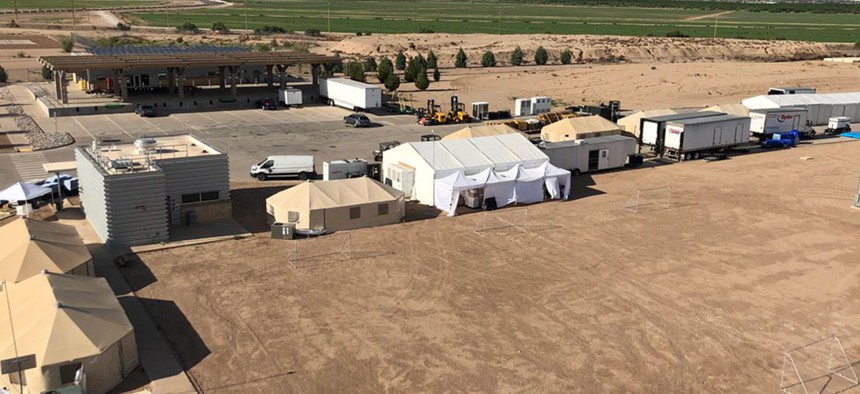
HHS
The U.S. Government is Relocating Migrant Children To Barren Tent Cities Near The Mexico Border — At Midnight
Migrant children are being transported from foster homes and shelters around the country to a remote tent city in Tornillo, Texas, sometimes in the middle of the night.
The U.S. is currently home to close to 13,000 detained migrant children, the largest population ever. Sunday, The New York Times reports that in recent weeks a growing number of them have been moved, often in the middle of the night, from foster homes and shelters all over the country and transported to a tent city in Tornillo, Texas, a remote location near the Mexican border.
“In order to avoid escape attempts, the moves are carried out late at night because children will be less likely to try to run away,” The Times writes. “For the same reason, children are generally given little advance warning that they will be moved.”
The Tornillo facility has been described as “a pop-up city” and was set up in June of 2018 to hold 400 children. That number was expanded to 1,200 later in the summer, and in mid-September, Texas Monthly reported that the facility would expand to house 3,800 children, and plan to stay open at least through the end of the year.
Children who are detained and held in federal custody can be released to parents, family members, or friends who apply to be their sponsors. Earlier in September, Matthew Albence, acting deputy director of Immigrations and Customs Enforcement told Congress that the agency had recently arrested 41 applicants seeking to sponsor children in custody.
In Tornillo, migrant children are separated by gender, and sleep in air-conditioned bunk tents. Unlike the foster homes and shelters many of them are coming from, there are no schooling requirements. Border Patrol data for the Southwest indicates that between Oct. 1, 2017 and Aug. 31, 2018 45,700 unaccompanied were detained at the border, an increase of 19% over the same period for the previous year.
The majority of the migrant children in Tornillo are teenagers who are waiting placement with family in the US. “The move to Texas is meant to be temporary,” The Times writes. “Rather than send new arrivals there, the government is sending children who are likely to be released sooner, and will spend less time there.” The Department of Health and Human Services told The Times that the average length of time a migrant child remains in custody has nearly doubled over the past year, from 34 days to 59.






